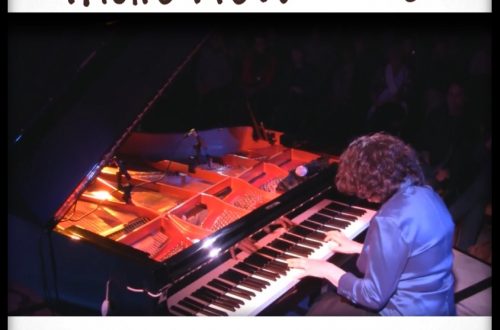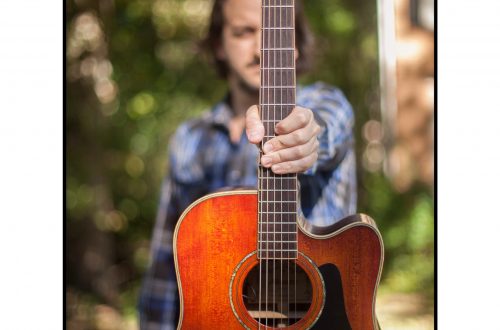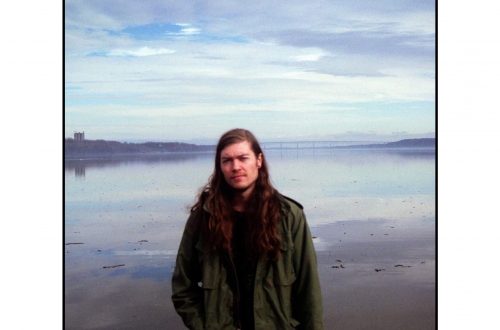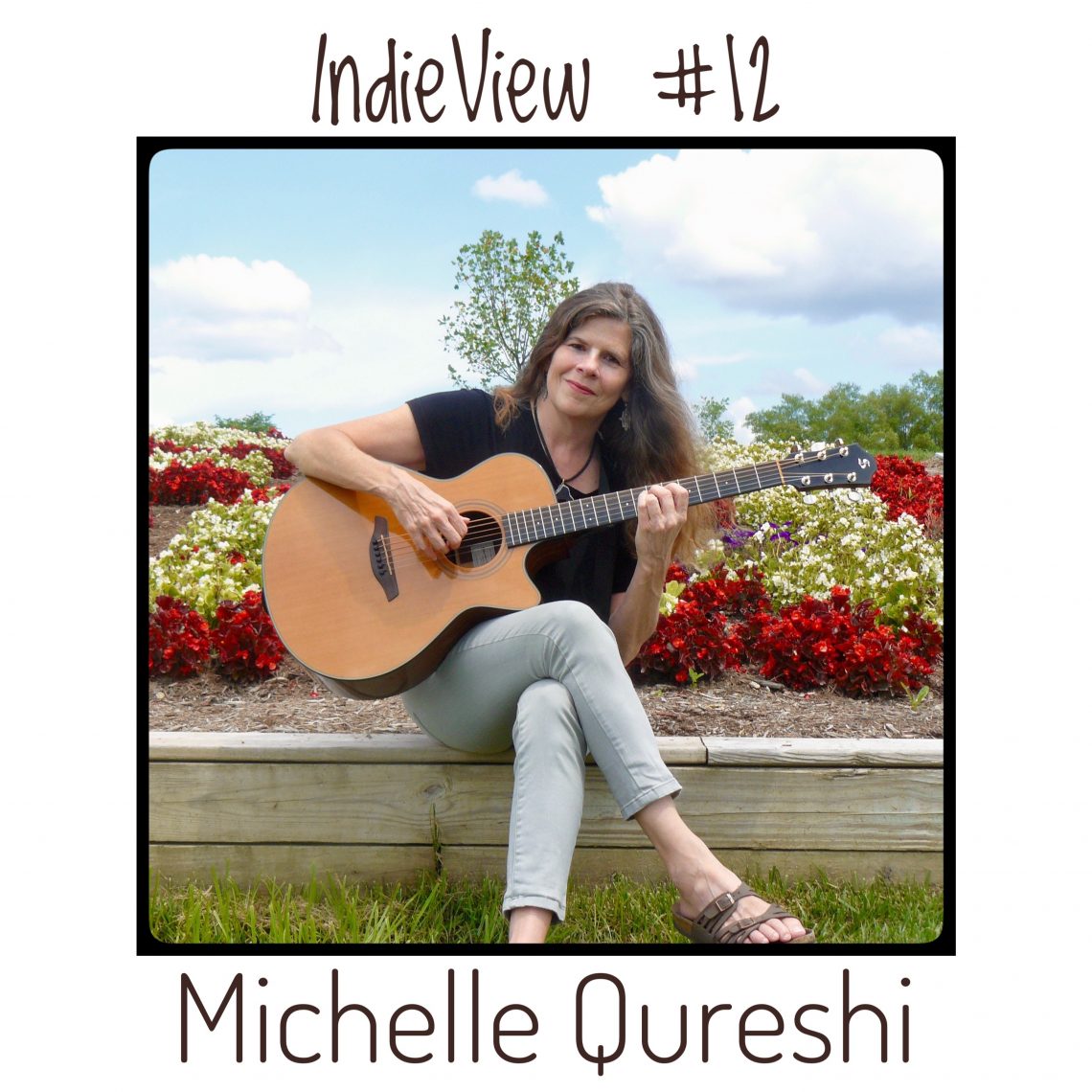
Michelle Qureshi – IndieView #12
In this Twelfth episode of the IndieViews Series, we are going to chat with Award-winning Artist Michelle Qureshi
A tie between a classical music concert at Tanglewood, summer home of the BSO, at a concert by the Academy of St. Martin in the Fields and a concert trio of Classical Indian music with Zakir Hussain.
So, chronologically, the single Inside the Lightbox is an 11 minute long trip ambient piece followed by a more new age single over 9 minutes long titled Floating, both on the Heart Dance Records label.
At the same time I was working on my next albums, releasing a collection of 17 acoustic guitar tunes on my label Music as Metaphor, followed by a release of an ambient album, Silver Chord, on the Heart Dance Records label.
That album features an opening track collaboration, with California based ambient artist David Helpling, marking the first time I had a musician other than myself featured on one of my albums. Soon after that release, I was a featured guest artist on the album Perihelion by Al Jewer and Andy Mitran of Chicago.
I also collaborated with Norwegian based fellow guitarist Tommy Berre (Read our IndieView with Tommy) on a track titled An Offering.
Currently in the works as well is a collaboration with the UK based artist Paul Landry.
As far as my live performances, along with house concerts, I play a fair amount at yoga studios accompanying classes, and last month I launched a project I call Harmonic Sound Immersion™ which is essentially a “horizontal concert”.
People are invited to locate themselves comfortably on a mat or blanket on the floor and close their eyes while I engulf them in sound-playing everything from my guitars to my Music as Metaphor singing bowls, to flutes, didgeridoos, gongs, a ROLI Lightpad Block, and more.
The participants report this to be a very deep, almost active dreaming experience that leaves them refreshed, peaceful and relaxed.
ALBUM PRODUCTION
Like having some quiet time and picking up a guitar, generally, a new idea is always waiting. Exploring some electronic sounds at my keyboard-I recently got a ROLI keyboard that presents some awesome ways to make sounds and then have expanded dimensions of touch over these sounds.
Time in nature, peaceful moments, this can slow my mind down so that I get the usual mental chatter quiet enough to hear some beautiful stuff come through me.
At the same time, I can be walking through a loud market and still “hear” something that inspires. So, the process is just as creative as what you create sometimes.
As pieces ready themselves in my studio I look for ways that the music finds an interconnectedness then gather those tracks for an album. I have many. many tracks in progress at any given time. I don’t know that I can catch up with finishing existing ideas because new ones come in all the time! I am thinking maybe even the whole album concept is wrapping up for me and I will steadily release singles.
Think about playlists-track upon track of various artists.
If someone does dial in your album and it’s a free platform it will be shuffled! So, again there are lots of things to re-think.
I already know just listening to something with another person changes how you hear it. So yes I hope that option is in my future.
No. The 3 albums on the Heart Dance label where mastered in a studio where the record label is based. The rest is my work.
“I believe that the angels speak not in words, but in music. Perhaps this is their conversation perceived across the boundless distances of the firmament. Through the performance of Michelle’s electric guitar it might be a prayer, or it might be a poem, but it is certainly an exchange on a higher plane than the physical.” ~R.J. Lannan, Zone Music Reporter
ALBUM PROMOTION
Before I worked with this label, I reached out to DJs and stations one at a time as I made connections on social media.
Trying to find your audience is a major goal of the indie artists and finding programmers who like your music will get it played.
I understood that you are an old school musician, like me. But both of us are discovering more about the “new world” of streamings, playlisting etc. Can you tell us what do you think about it?
There is an efficiency with streaming that I like.
There is also the ongoing possibility of new discovery for your music and always locating a new fanbase, especially with music like mine, which ranges from New Age, Ambient, Neoclassical and World.
Have you learned any “promotional strategy” that you would share with the music community?
From my recent experience, it is best when you combine your efforts with like-minded musicians and support each other, this brings about great results for all!
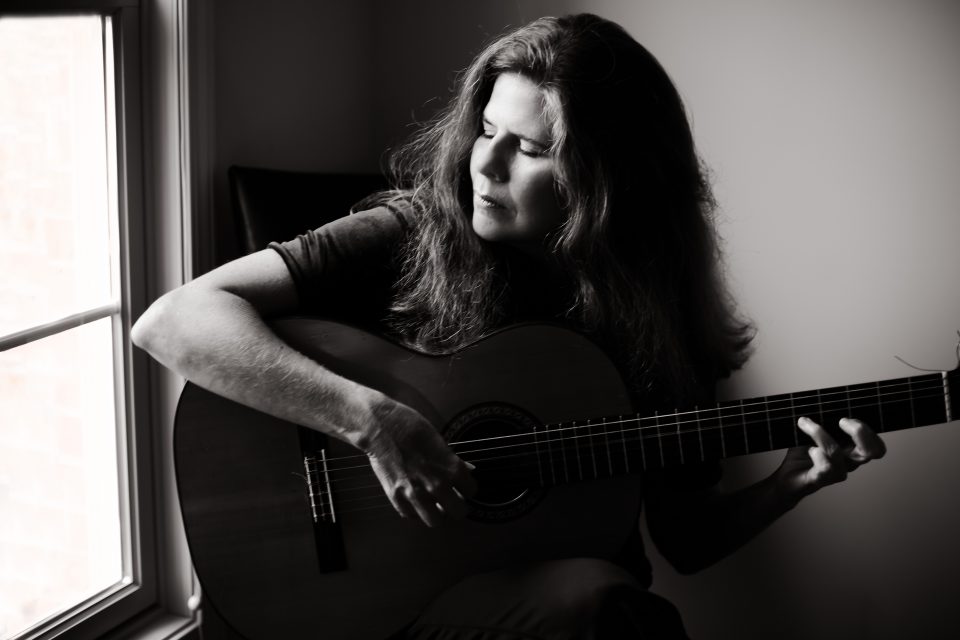
GUITAR QUESTIONS
In which way your Classical background helped you in your Fingerstyle/AcousticGuitar Career?
In a lot of ways, I just apply my classical guitar techniques to the steel strings and then incorporate some skill sets that are unique to the tension and feel of a steel string guitar.
Do you have any favourite tunings for your guitar? And why?
I love to create pieces in alternate tunings not just for the new way of looking at the fretboard but for the way the strings ring together differently when they are tuned to different pitches. I do love getting my lowest string down to a C to feel that vibration against me.
Tell us more about your guitars, brand, models and why you play these instruments.
Well the first steel string I recorded with was a loaner guitar from my cousin, a Furch guitar made in the Czech Republic.
After a couple years I learned that the Furch brand Canadian American distributor is called Stonebridge Guitars here and so I became a Stonebridge artist ambassador, when I started playing their G-22 CR-C model.
The same cousin also loaned and then gave me the electric guitar featured on my recordings, a lovely blue De Armond. I met at NAMM in Nashville a guitarist who drew me in to his booth playing a guitar with a lovely rich sound.
I had the chance to play it, called a Villela and I am now also an artist ambassador for this instrument, a guitar pitched an octave lower than a standard guitar. You can hear both the Stonebridge and Villela guitars on my recent album Short Stories.
I am currently searching for a nylon string classical crossover that is a good match for my music.
Beyond that I have an assortment of instruments, owned or borrowed that I use in recordings and performances, such as ukulele, mandolin, banjo, Native American flute, didgeridoo, slotted tongue drum, cello, sitar, oud, cumbus, singing bowls, drums and ROLI instruments.
Any favourite brand of strings and gauge? Why?
For my classical guitars I use Oasis strings, the titanium medium hard tension.
On steel I use Nicola brand strings and I tend to need a light gauge or my fingers fatigue quickly.
I really have no preference on the electric guitar at this time.
As guitar player each of us at least discover his favourited techniques, did you have one? How do you discover and learn?
I love the use of slide and harmonics in my playing as well as a variety of lengths of capos combined with alternate tunings to really create something unique.
“She seems more of a sonic sorceress using a wide range of instruments and technology in her artistic alchemy.” ~Michael Diamond, Music and Media Focus
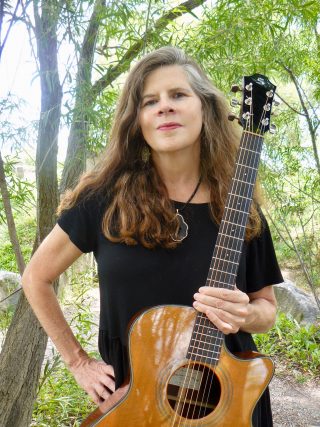
LIVE MUSIC
Since I’m my own agent the only costs are transportation and lodging and I also don’t have to share any income.
I’ve taken my beautifully designed new branding identity and created mugs and magnets that display quotes that have inspired my music.
For example, from my album Scattering Stars, I have a mug that illustrates this Rumi quote: “We come spinning out of nothingness, scattering stars like dust”.
Another aspect of my business side is my recent manufacturing of Music as Metaphor branded singing bowls.
I use them both in my sound immersion classes and offer them for sale at yoga and meditation classes.
I’ve never actually played at a club, just homes, yoga studios, art galleries, wineries, special events and festivals.
But once you settle in to your sound it’s just about the music.
I want to hold the silence between the notes so that I can hear just collective breathing at times, and I like to glance around and see people’s eyes closed when they are moving deeply in to the sounds.
I’d like to have back any time that I feel that glow of energy around me, if it happens to leave me briefly in a performance for what ever reason-I’d want that back.
“What Michelle Qureshi does so well here is create something new and fresh …she has an amazing ability to change course and create something outstanding at a whim.” ~Steve Sheppard, One World Music Radio
MUSIC BUSINESS
But generally I’ll run through my phone with morning coffee, then I need time with music. The follow ups, tasks and chores really vary on my schedule but it all has to get done by me at some point.
I try to make the social media aspect creative and it’s valuable to me when I feel I am actually connecting person to person, but some of these tasks, like following up on leads or waiting for responses or tracking ways you find your music being exploited, that’s all very tedious.
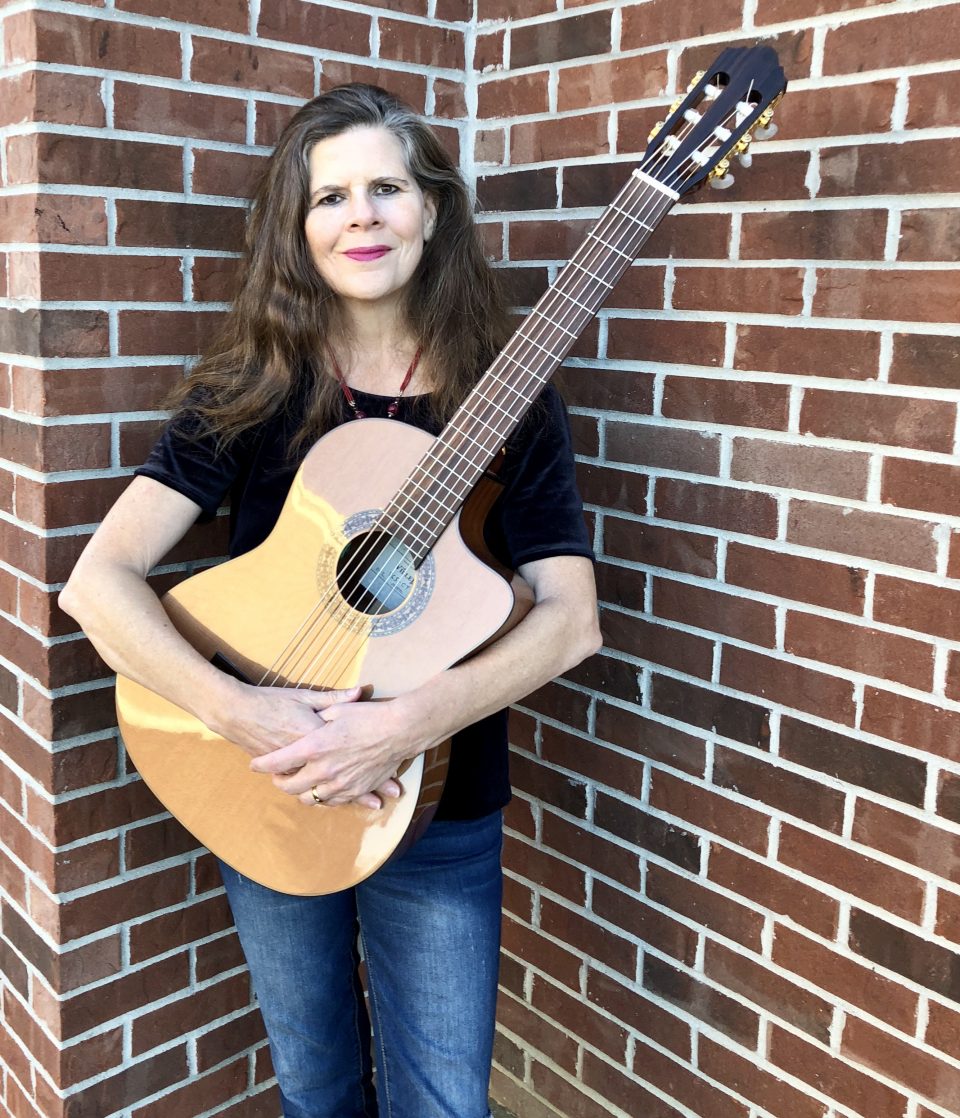
SOCIAL NETWORKS
What’s your relationship with the social networks?
Thank you Michelle fro your music and for your replies here. Would you like to add something else?
I studied music and graduated with Bachelor and Master of Music degrees but did not realize my potential at that time because shortly thereafter my life took a different turn due to a tragic and unforeseen family situation.
I found myself moving from the vibrant and musically rich environment of NYC to a place and a situation that put my music career on hold. As time went on, I got married, started our family and in raising my daughter, fell in love with life again.
As she grew up, I gradually brought my guitar playing back to life, both to expose her to music and to answer my needs as a creative being.
I share this because this whole music thing happening for me now, composing and producing albums, taking my classical guitar skills to the platforms of steel string acoustic and electric guitars, exploring an array of world instruments and electronic instruments, meeting and collaborating with many musicians -this is all happening to me as a middle aged woman, I am well into my fifties, and feel I’m just getting started. I’ve never been one to set goals, maybe because I prefer to go where life takes me, knowing there is a reason for each experience, and the flow of life is unique to each of us. Thank you for the opportunity to share about my life and music here and I wish all the best for any musicians starting out.
We live in a time where creativity is so important yet not rewarded as much as it should be, so it takes a lot of perseverance to honor your path as an artist.
Listen to Michelle’s Music on our Spotify Playlist with the other IndieView’s Artists and don’t forget to follow and share it.
DISCOVER MORE ABOUT MICHELLE:


